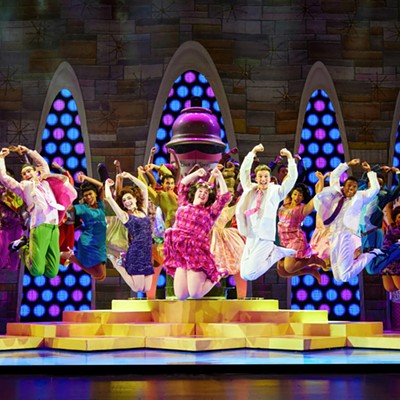It's certainly an odd couple that inhabits Stephen Sachs' strange little play, Bakersfield Mist, produced by Invisible Theatre and running through this weekend.
Actually, that's an understatement. Odd only scratches the surface of this story, which is based on an actual event. In that story Teri Horton, a 73-year-old retired truck driver from San Bernadino, paid a few bucks at a thrift shop for a painting to give as a gag gift for a friend. But a local school teacher suggested it might be a Jackson Pollock. That set off a bit of scurrying around, trying to determine if it was authentic.
In IT's play, Sachs sets up a very similar situation. Maude Gutman (Susan Kovitz,) a dumpster diver and yard sale aficionado has created, in her mobile home, her version of a museum of sorts, populated by her strange and mis-matched findings. She has bought a thrift store painting which she thinks is a Jackson Pollack worth, oh, between 50 and 100 million. But it's not signed. So she scrapes together a rather tidy sum to bring Lionel Percy (Roberto Guajardo, a high-class New York art authenticator) to Bakersfield so he can take a look.
So there's your odd couple: an out of work bar maid who swills Jack Daniels like it was lemonade and Lionel, stuffy, pretentious, obviously bursting at the seams with confidence in his knowledge about—and veneration for—fine art. He is obviously uncomfortable with his surroundings and Maude's boozy ways.
After Lionel, without much hesitation, pronounces the painting a fake, Maude won't back down. It's real, she insists. How can he tell with so little inspection that it's a fake? It's his blink, he tells her. He knows so much about authenticating art that he can take one look and make his determination. But Maude persists.
There's an extended monologue in which Lionel shows his passion for and connection with Pollack's work. He is eloquent, credible, and also actually reveals a genuine vulnerability. Guajardo gives us this side of Lionel beautifully.
Still, Maude doesn't back down. She's done her homework on Lionel and is ready to exploit her knowledge. The two engage in this awkward dance of a conversation, which involves a gun, a knife and an offer of sex by Maude. But even with the actors' best efforts, their attempts to relate are about as authentic as Maude's painting.
Sachs seems to want to probe issues of class and to ask questions about art, and who judges it to be so, and authenticity, both of the artistic and human sort. But the whole set-up is just so convoluted, and Maude and Lionel's interactions are so implausible that it's not altogether clear what Sachs is ultimately trying to get at. These two fine actors and experienced director Gail Fitzhugh have given the play every opportunity to deliver the goods. It's an entertaining enough 80 minutes, but in the end, Sachs wimps out and we're not quite sure where we have been led.
I don't think I'm giving anything away when I tell you how Shakespeare's surely most-quoted tragedy, Hamlet, ends. There are about a half dozen dead bodies strewn about the stage, including that of the prince himself. Ah, those Elizabethans loved a stage full of dead bodies.
The rogues at the Rogue have concocted a duet of Shakespeare-centric plays produced in rotating rep (which just means, generally, they play on alternating nights). Here we'll look at Shakespeare's work, and next week we'll check out Rosencrantz and Guildenstern are Dead by English playwright Tom Stoppard. (These two characters inhabit Hamlet in a smallish way and end up—you guessed it—dead.)
As for Rogue's Hamlet, it's a treat. It's the well-known story of Denmark's young prince who thinks he sees the ghost of his father, who tells his son he was the victim of murder by his brother, Claudius (Joseph McGrath), in possible conspiracy with his mother, Gertrude (Kathryn Kellner Brown), who then wed just weeks after Hamlet senior was killed. He pleads for Hamlet to revenge his death, which charge the younger Hamlet, after a bit of waffling, decides he must do. The play proceeds with Hamlet calculating how best to get the revenge his father has demanded. And wouldn't you know it? It involves the production of a play.
Hamlet was none too happy to begin with. He didn't think all was copacetic when his uncle Claudius so quickly replaced his father as king and as husband, and as he begins to plan his revenge, the story becomes more complicated as Hamlet's behavior becomes increasingly erratic, some believing he is grief-stricken, others lovesick and to others, quite mad.
But if he is mad, says Polonius (David Morden) there is "method in't."
And that there is.
The key, of course, for making a production of this play work is an excellent Hamlet, and Rogue has given us one. Matt Bowdren's impressive skills have been demonstrated on Rogue's stage for quite a few years now, but it's his performance in this role that shines the brightest. He captures Hamlet's complicated personality, his intelligence and his wit with credibility and vulnerability, giving us an artfully compelling and complex character.
Director Cynthia Meier has, at her disposal, a greatly skilled crew of actors, and she has used them well to weave a captivating tale. Oh, and she also designed the costumes. And she corralled the talents of Joseph McGrath and Don Fox as scenic and lighting designers, respectively. The live music of Jake Sorgen underscores the entire show.
The first act works really well; the second gets a little too complicated, but that's the nature of the script and its subplots. Overall, this is a very well done production. You shouldn't miss it.
And if, as Hamlet instructs the actors of the play within a play, "the purpose of playing, whose end ... is to hold, as 'twere, the mirror up to nature," we earthlings are in a whole mess of trouble.








